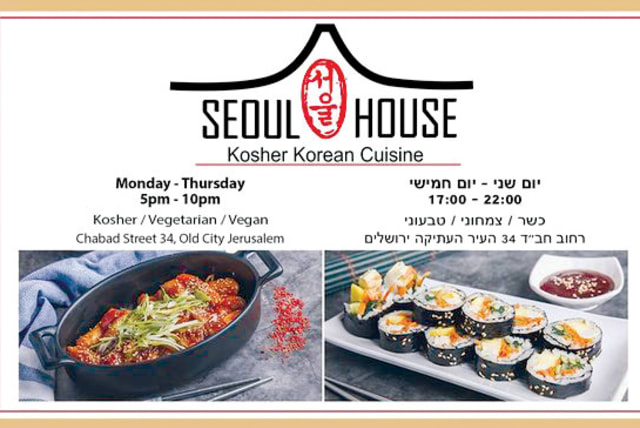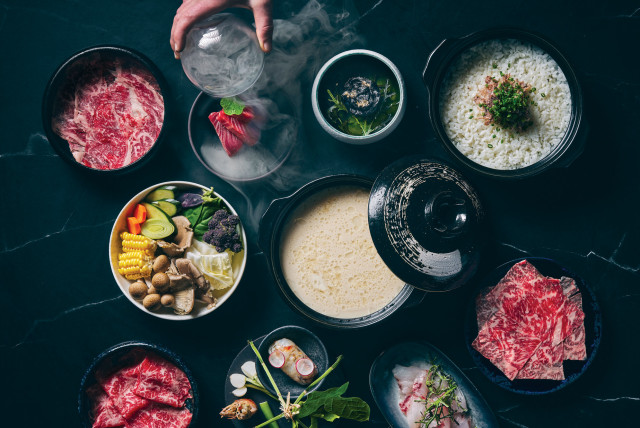Not just ‘Pan-Asian’: A taste of authentic Far Eastern cuisine in Israel

As a country that is always a little behind and with Asian immigration slowly increasing, influence on cuisine in Israel is only starting to lay deep roots.
“If you seek authenticity for authenticity’s sake, you are no longer authentic.” – Jean Paul Sartre
On September 16, 1993, Charles Perry of the Los Angeles Times said that “fusion” in reference to cuisine “may be the culinary buzzword of the 1990s.” At that time, it was a rather innocent word. Restaurants that branded themselves as “fusion” were new and exciting, giving folks food that could be more palatable to their tastes (cough, cough, Wolfgang Puck).
With the turn of the century came heightened awareness about the possible harm and the cultural appropriation that chimera monstrosities such as the sushirritto or the ramen burger cause. It was often privileged, non-ethnic people who introduced ethnic food and profited from its “exotic” or “foreign” qualities.
Enter “authentic” – the new buzzword of the culinary world created from this cultural seesaw, and definitely the most loaded one. You weren’t a “true foodie” if you didn’t like “authentic food.” This was great for marginalized communities, especially in melting pot countries. There was supply and demand for introducing traditional customs and methods to people wanting to expand their horizons.
There was one problem, though. “Authenticity” has lost its meaning. It became synonymous with run-down, hole-in-the-wall restaurants serving soups exactly as their grandmother made it. It became a competition between elitists to seek those places out and gate-keep them. It became the “only way to enjoy food.” It became just another micro-aggression. Food is a fluid thing, especially in the context of migration and location. It is arbitrary, adapting to the climate, soil, and ingredients of the place it is situated, and nigh impossible to pin down. It cannot be frozen in space and time. However, that also doesn’t mean the food has to uproot itself.
Brandon Jew, executive chef and owner of Master Jiu, a Chinese Michelin star restaurant in San Francisco, wrote in his and Tienlon Ho’s book Master Jiu’s in Chinatown, “To me, authentic food isn’t about a moment in time. People change, and move, and so does what they eat. China didn’t even have chilis until about 300 years ago, but they are essential to mapo doufu, a now classic Sichuan dish. I also don’t believe authenticity has to be dependent on location. The same ingredients will taste different depending on where they’re grown. Cooking is about adapting to what’s around you.”
For Jew, “There’s also a very personal sense of authenticity you feel when you eat something that tastes just how you remember it. My childhood was not identical to yours, so our nostalgia takes us to different places. To me, a more communal way to look at authenticity is in the way a dish embodies cultural traditions; not necessarily in one specific way, but in details that show intention and knowledge. When you cook food that means something to a lot of people, you don’t have to look a certain way or have the culture in your blood. You just have to care.”
Israeli takes on Asian cuisine
With that in mind, what does Israel’s take on this look like? As a country that is always a little behind – as it seeks to keep up with Western trends – and with Asian immigration slowly increasing, influence on cuisine in Israel is only starting to lay deep roots. These few restaurants will hopefully help pave the way in expressing and introducing respect for the cultures and foods of these countries.
Korean
Except for Kimchi’s in Tel Aviv, the only other Korean restaurant in Israel – also, incidentally, the only kosher Korean restaurant in the world – is Seoul House. In a small side alleyway in Jerusalem’s Old City, Ziporah Rothkopf, a Seoul-born convert to Judaism, opened the mostly vegetarian (two dishes are pescatarian) Korean restaurant.
It serves dishes such as tteokbokki – Korean rice cakes in a sweet and spicy sauce. And it sells specially imported condiments like Gochujang and soybean paste. Its kimchi – unlike that of most restaurants that offer kimchi – is made with the Korean chili powder that lends its fiery red color and spiciness; and kimbap, a Korean take on sushi.
There’s a sore lack of Korean influence in Israel, especially with no Korean BBQ spots, but hopefully Seoul House can be an apt beginning.
Thai
At the end of the 1980s, a young and adventurous Yariv Malili found himself in the Kawasan street in Thailand. What started, according to him, as a “culture shock” quickly turned into “home.” Malili describes the atmosphere in the street as complete freedom. He subsequently moved to a small village in Isan, the northeastern region of Thailand, where he lived a truly simple life, herding buffalo and cows, and working on a fishing boat, earning just the fish he caught. After two years in the village, he returned to Israel and opened the Thai House restaurant in Tel Aviv, merging his love of Thai culture and culinary arts in a building on Bograshov Street.
Thai House cuisine is typically based on the Isan region, which includes coconut milk and a variety of curry pastes and classic street food; and serving hot and cold dishes in tandem – mainly ones meant for sharing. Notable dishes are the Pla Takai, a whole sea bass in hot chili Tamarind sauce; and the green curry with coconut milk, Thai eggplant, Kaffir lime, and a choice of protein.
A Thai House representative told The Jerusalem Report: “The restaurant, which started as a Thai restaurant with a few individual tables, was the first to develop Thai food and culture in Israel. Thai House makes Thai food accessible to the Israeli public in the most authentic way, with local ingredients such as fish from the Mediterranean, locally grown meats, and a selection of traditional Thai vegetables that we grow on a private farm. All the dishes served in the restaurant are made daily from fresh ingredients only, in keeping with Thai cuisine.”
Vietnamese
Besides Banh Mi Factory on Frishman Street in Tel Aviv, and Pho 26 in Haifa’s Talpiot Market, which are street food-oriented, one restaurant that encapsulates Vietnamese cuisine is Vong, located on Rothschild Boulevard in Tel Aviv.
“Eight years ago, we felt that something important was missing in the country’s culinary scene. So we opened Vong, the first Israeli Vietnamese restaurant. Vietnamese cuisine is the fresh corner of Southeast Asia and aspires to set a table that has five colors, the five nutrients, the five flavors, and activates the five senses.”
And indeed it does, with dishes ranging from cloud-like fluffy bao buns with different proteins; banh mi, a classic Vietnamese baguette sandwich; and the timeless pho – a rich beef broth with lots of herbs, lemon and chili, and rice noodles.
Chinese
Peking Duck House, also known as HaBait HaSini, fittingly adjacent to Thai House on Bograshov Street, is almost always filled to the brim with Chinese youngsters and businesspeople, which implies that the restaurant is simply the closest thing to China they can get in Tel Aviv. It serves rarities like a hotpot meal, which consists of two different boiling broths, where the diners (the more, the merrier) can choose add-ons such as lotus root, “elephant’s ear” mushrooms, seafood, beef, or chicken. The restaurant derives its name from the crispy and tender Peking duck, usually served in a rich noodle soup.
On the more kosher side of things is Sheyan, situated in the picturesque Rehavia Windmill on Ramban Street, a longtime staple of religious wedding dinners in Jerusalem. Alongside many schmoozing Anglos, you’ll find classic Chinese dishes such as fried beef in tempura with sweet and sour sauce and Mongolian noodles.
Japanese
On a rather unassuming corner of B’nai B’rith Street in Hod Hasharon lies Yamatoya, a charming little portal to everything tasty and comforting from the Land of the Rising Sun. Here, you’ll find Japanese delicacies unlike anywhere else in Israel, such as Natto (funky, sticky and bombastic fermented soybeans one mixes with egg yolk and mustard, laid over rice); Nabemono (a dish containing noodles, rice, and a choice of protein or seafoods which, after finishing, can be given back and turned into a Zusoi, a scrumptious Japanese egg risotto); and Sake no Hara/Kama (the belly/collar of a salmon, as tender as a steak and far superior to a regular cut). When it comes to trying out new dishes in an accessible setting, Yamatoya takes the cake.
People who pride themselves as ramen lovers should try the now famous Mententen in Tel Aviv’s Nahalat Binyamin, but it has plenty more to offer. There’s a constant stream of vibrancy there, with the innovative izakaya style small dishes; the delectable and rich soups coming straight from Shinjuku in the heart of Tokyo; and the traditional Japanese coal grill meats, as well as a beautifully designed tatami mat room. According to sources at Mententen, “The place is known and loved mainly for its famous ramen that brings the Japanese palate to Israelis. Dining in the restaurant space provides an authentic Japanese atmosphere in the interior design of the restaurant, the adjacent bar space, and the tatami room with traditional low seating, as well as the aromas that surround the space and the Japanese music that is played during the day. Japanese chef Makoto Okazaki is responsible for Mententen’s menu. He comes directly from Japan every few months to work hard on building a new menu that is suitable for the current season and the ingredients that characterize it.”
Those who don’t mind splurging a little should absolutely hit Umai in Jaffa for one of the most profound and innovative dining experiences in Israel. Kaiseki is a traditional holistic multi-course dinner that emphasizes a seasonal theme with the highest quality and freshest ingredients. This inspired a 10-dish tasting menu that lasts for three hours. For one day every week, a classic izakaya style a la carte night is held at Umai, the home and culinary space of owner and executive chef Alexandra Abramov, on Abed El Rauf Al Bitar Steet.
There’s plenty more room for Israel to grow when it comes to cultural diversity and inclusion. It takes a lot of goodwill and care for that to happen, and the one commonality among all these varied and unique restaurants is that they really do care. Happy dining! ■
Jerusalem Post Store
`; document.getElementById("linkPremium").innerHTML = cont; var divWithLink = document.getElementById("premium-link"); if (divWithLink !== null && divWithLink !== 'undefined') { divWithLink.style.border = "solid 1px #cb0f3e"; divWithLink.style.textAlign = "center"; divWithLink.style.marginBottom = "15px"; divWithLink.style.marginTop = "15px"; divWithLink.style.width = "100%"; divWithLink.style.backgroundColor = "#122952"; divWithLink.style.color = "#ffffff"; divWithLink.style.lineHeight = "1.5"; } } (function (v, i) { });

